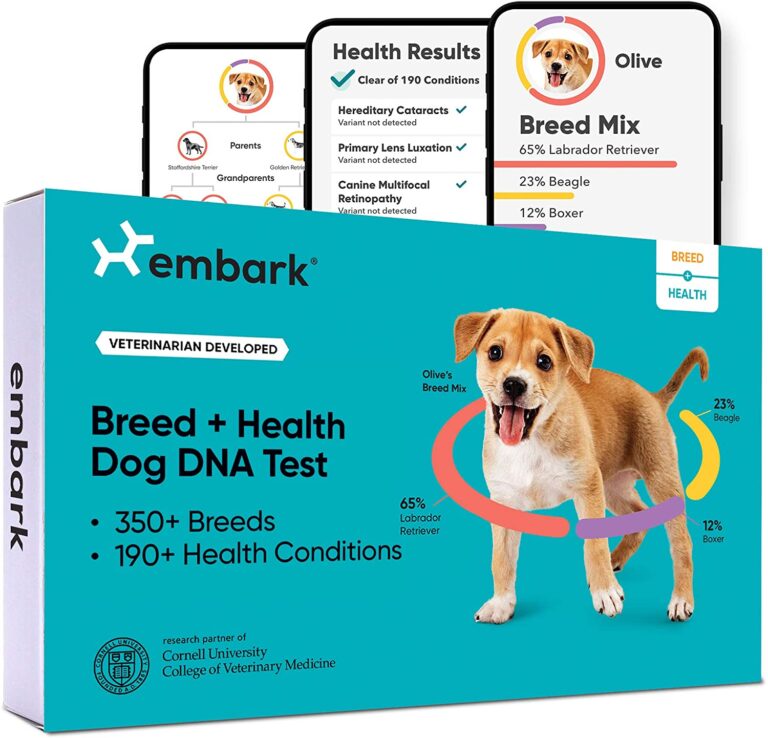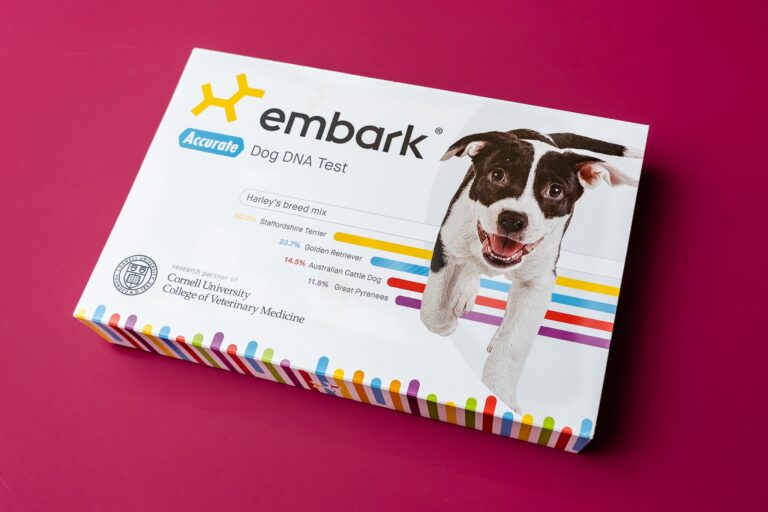As a dog owner, you may have heard about the latest trend in pet genetics – DNA testing. With just a simple swab of your pup’s cheek, you can uncover valuable information about their background, health risks, and even confirm their purebred status. But with so many test kits on the market, the question remains – how accurate are these tests? In this blog post, we’ll explore the facts behind canine DNA testing and help you make an informed decision when it comes to testing your furry friend’s DNA.
I. Introduction
A. Explanation of dog DNA tests
Dog tests are becoming increasingly popular among dog owners who want to understand their dogs’ background and medical history. DNA testing kits are relatively new in the market and require dog owners to swab their dog’s mouth for a saliva sample or send in a sample of feces for testing. Once the kit is mailed to the company’s laboratory, the results are analyzed and provided to the dog owner. The depth of these results and the specific services provided will vary from one dog breed DNA test kit provider to another. While manufacturers claim that tests are 90 percent accurate or higher, there is a lack of verifiable data regarding the accuracy of these tests. Anecdotal evidence suggests that many dog owners believe the DNA kits are generally accurate, citing the kits’ accuracy in identifying information that dog owners can confirm, such as hair color and breed. However, dog owners should take results with a grain of salt, and be aware that even in the best-case scenario, these tests have the potential to be wrong. [1][2]

B. Importance of dog DNA tests for dog owners
Dog DNA tests have become increasingly popular among dog owners worldwide. Despite the questionable accuracy of these tests, they offer a range of benefits that can help dog owners provide better care for their furry friends. One of the main advantages of dog DNA tests is that they can give owners a better understanding of their dog’s breed and heritage. This information can enable them to tailor training, exercise, and diet regimens to their dog’s specific needs. Additionally, DNA tests can identify potential health issues that may develop in the future, allowing owners to take preventative measures to protect their dog’s wellbeing. DNA testing can also be useful in resolving disputes between owners over a dog’s lineage and legal disputes regarding breed regulations and ownership. While it is important to note that dog DNA tests are not 100% accurate, they can provide valuable insights that can ultimately improve a dog’s quality of life. [3][4]

C. Overview of the questions dog owners may have
Dog DNA tests have gained popularity in recent years, as they allow dog owners to learn more about their pets beyond their physical appearance. However, many dog owners may have questions when it comes to these tests. Here’s an overview to answer some of these common questions.
– How do you collect a sample for a dog DNA test? Most tests require a simple swab of saliva from the dog’s mouth or a fecal sample. It’s important to follow the instructions carefully to avoid contamination.
– How accurate are dog DNA tests? Manufacturers claim accuracy rates of 90% or higher, but there is a lack of peer-reviewed research backing up these claims. Anecdotal evidence suggests that the tests can accurately identify breed information, but results should be taken with a grain of salt.
– How much do dog DNA tests cost? Prices typically range between $60 and $150, with higher-priced options offering more counseling and support.
– Can DNA testing help register a dog with the American Kennel Club? It’s possible, but the process is not guaranteed and is strict.
– Which test is best? Due to the lack of verifiable data, it’s hard to determine which test is the most accurate. However, tests like Embark and Wisdom Panel offer additional counseling to help owners understand the results and their implications for a dog’s health.
Overall, while dog DNA tests can offer valuable information, owners should approach the results with caution and consult with their veterinarian for further guidance. [5][6]

II. How Dog DNA Tests Work
A. Swabbing saliva or sending in fecal sample
One of the ways to obtain your dog’s DNA is to swab their saliva or send in fecal samples. This is a relatively quick and easy process, with most DNA testing kits requiring you to swab your dog’s mouth for saliva or send in a sample of feces for testing. Once you gather the samples, you mail them to the testing company’s laboratory for analysis. It’s advised to follow the instructions provided by the testing kit carefully to ensure accurate results.
The depth of results and the specific services offered will vary from one dog breed DNA test kit provider to another. Some will email you with the results while others may contact you by phone and even offer consultation with a geneticist to answer any questions you may have.
It’s important to note that while many dog DNA test kit manufacturers claim that their tests are 90% accurate or higher, some veterinarians and genetic experts aren’t ready to stamp these kits with a seal of accuracy. This is mainly due to the lack of peer-reviewed research regarding the processes used by these test kits. However, anecdotal evidence suggests that many dog owners believe the DNA kits are generally accurate, citing the kits’ accuracy in identifying information that dog owners can confirm, such as hair color and, in some cases, breed.
Despite the claims made by manufacturers, dog owners should take the results with a grain of salt and be aware that even in the best-case scenario, these tests do have the potential to be wrong. Therefore, it’s advisable for dog owners to seek professional advice for any medical conditions rather than relying solely on the results of a DNA test. [7][8]
B. Mailing samples to the testing company
Mailing Samples to the Testing Company
Once an owner decides to administer a DNA test for their canine friend, they have to take a sample of their dog’s DNA. Companies offering dog DNA tests typically provide an easy-to-use kit that requires either a swab of saliva or a sample of fecal matter. The kit comes with instructions on how to collect the samples. However, mailing these samples to the testing company is where the process gets complicated. Dog owners need to consider a few things while sending their DNA samples to the testing company, including:
1. Most DNA testing companies provide prepaid envelopes that owners can use to send their samples. However, the envelopes might not fit larger samples like fecal matter.
2. Some companies do not provide an envelope or a box to mail back the kit. In such cases, dog owners might need to figure out the most cost-effective way to send the samples back.
3. Mailing samples internationally might be expensive and complicated. Some countries have strict rules and regulations on mailing biological samples. Dog owners must research the specific requirements of their country of residence regarding mailing biological samples.
Overall, dog owners must test their dog’s DNA through a reputable and established company while being mindful of the process’s shipping and handling. [9][10]

C. Variation in depth and specific services offered
Dog DNA tests vary in depth and specific services offered by different manufacturers. These variations are due to factors such as the number of markers analyzed, the size of the breed database, and the specific genetic diseases screened for. Embark is one of the best dog DNA tests available in terms of comprehensiveness and accuracy, with a breed database covering most dogs recognized by the American Kennel Club, as well as some street dogs and the gray wolf. The company claims its breed results are 95% to 99% accurate, and it analyzes twice as many genetic markers as its rivals. Additionally, it screens for more genetic diseases than any other kit, with its genetic-disease detection tool screening for 210 mutations. On the other hand, Wisdom Panel’s breed analysis covers more than 350 different breeds, including the coyote, the Mexican street dog, and the wolf. However, Wisdom Panel analyzes fewer DNA markers than Embark, so its results may not be as accurate. Despite these differences, both kits aim to help dog owners identify their dogs’ breeds and potential health risks. [11][12]

III. Accuracy of Dog DNA Tests
A. Manufacturers claim tests to be 90% accurate or higher
Manufacturers of canine DNA tests often claim their products to be 90% accurate or higher. These tests work by identifying markers in the DNA and comparing them with the database of DNA taken from dogs with confirmed pedigree. The companies use an algorithm that looks at the number and types of these genetic markers and determines the dog’s breed makeup. However, there is still a lack of peer-reviewed research regarding the accuracy of such tests, making it difficult to verify these claims.
Anecdotal evidence suggests that these tests are accurate in identifying information that dog owners can confirm, such as breed identification or genetic disorders. Depending on the specific service offered by the testing company, dog owners can screen for a number of genetic disorders that certain breeds might have an elevated risk for. However, it is important to take the results with a grain of salt and not rely solely on them for important decisions regarding the health or well-being of the dogs.
In conclusion, while manufacturers claim canine DNA tests to be highly accurate, it is crucial to be cautious and consider the lack of peer-reviewed research in the field. Dog owners should weigh the benefits and potential limitations of these tests before investing their hard-earned money in them. [13][14]

B. Lack of peer-reviewed research regarding accuracy
While dog DNA tests have become increasingly popular among pet owners, there is a lack of peer-reviewed research regarding their accuracy. Currently, different test companies use different methodologies, which means there is no standard for comparison and it’s difficult to assess their accuracy. For example, Mars Petcare claims that its Wisdom Panel DNA test is 93% accurate in identifying different breeds in mixed-breed animals. However, there is no independent verification of this claim. Some geneticists and animal researchers have raised concerns about the level of accuracy of dog DNA testing and warns owners to be a little skeptical about results. Breed identification in mixed-breed animals can be challenging, as it’s based on thousands of genetic markers that are examined and compared to a company’s large breed database to calculate the best match. Without standardized testing and peer-reviewed research, the accuracy of dog DNA tests remains uncertain, which means owners should take the test results with a grain of salt and consult with a veterinarian if they have any concerns about their pet’s health or behavior. [15][16]

C. Anecdotal evidence suggesting accuracy for identifying information that dog owners can confirm
While there may be limited peer-reviewed research on the accuracy of dog DNA tests, some dog owners have reported anecdotal evidence suggesting accuracy for identifying information that they can confirm. This includes identifying specific breed heritage or confirming hair color. Some popular dog DNA test kits even offer insights into a dog’s potential future health conditions based on their genetic makeup. However, it is important to keep in mind that while manufacturers claim these tests to be 90% accurate or higher, they may not be foolproof. In fact, a Marketplace investigation found that nearly all the results from multiple dog DNA companies were different for the same dog, even though all claimed near 100% accuracy rates. As such, dog owners should take the results of these tests with a grain of salt and consider them as one of many factors when making important decisions about their dog’s health and well-being. [17][18]

D. Dog owners should take results with a grain of salt
Dog owners who are considering getting their canine’s DNA tested should take the results with a grain of salt. While manufacturers claim tests are 90% accurate or higher, there is a lack of peer-reviewed research regarding accuracy. Anecdotal evidence suggests accuracy for identifying information that dog owners can confirm, but it’s important to understand that these tests are not completely foolproof. Here are some reasons why dog owners should take DNA test results with a grain of salt:
1. Variation in depth and specific services offered: Different testing companies use different methodologies, which can lead to varying results. Some companies may offer more comprehensive testing than others.
2. Lack of oversight: There is no government oversight of the industry, so the genetic tests are not independently verified. In addition, some companies do not disclose their accuracy rates.
3. Risk of inaccurate breed determination: If the breed comes back as a potentially problematic dog like a pit bull, there could be issues with prejudices and actual discrimination against certain breeds of dogs that might impact things like housing and insurance.
In sum, while DNA tests can provide insights into a dog’s ancestry and potential genetic risks, their accuracy should be taken with a grain of salt. Pet owners should still be careful about making conclusions based on test results alone and consider consulting a veterinarian or genetic counselor for more information. [19][20]








